
Holborn, an area in central London, covers the south-eastern part of the London Borough of Camden and a part of the Ward of Farringdon Without in the City of London.

The Honourable Society of Lincoln's Inn, commonly known as Lincoln's Inn, is one of the four Inns of Court in London. To be called to the bar in order to practise as a barrister in England and Wales, an individual must belong to one of these inns. The other three are Middle Temple, Inner Temple, and Gray's Inn.
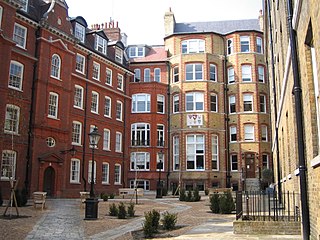
The Honourable Society of the Inner Temple, commonly known as the Inner Temple, is one of the four Inns of Court and is a professional association for barristers and judges. To be called to the Bar and practise as a barrister in England and Wales, a person must belong to one of these Inns. It is located in the wider Temple area, near the Royal Courts of Justice, and within the City of London. As a liberty, it functions largely as an independent local government authority.
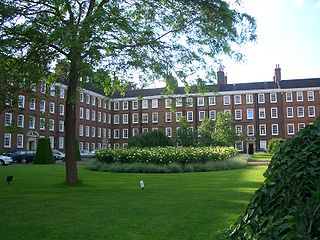
The Honourable Society of Gray's Inn, commonly known as Gray's Inn, is one of the four Inns of Court in London. To be called to the bar in order to practise as a barrister in England and Wales, an individual must belong to one of these inns. Located at the intersection of High Holborn and Gray's Inn Road in Central London, the Inn is a professional body and provides office and some residential accommodation for barristers. It is ruled by a governing council called "Pension", made up of the Masters of the Bench and led by the Treasurer, who is elected to serve a one-year term. The Inn is known for its gardens, which have existed since at least 1597.

The Inns of Court in London are the professional associations for barristers in England and Wales. There are four Inns of Court: Gray's Inn, Lincoln's Inn, Inner Temple and Middle Temple.

The Mercers' Company, or the Worshipful Company of Mercers, is a livery company of the City of London in the Great Twelve City Livery Companies, and ranks first in the order of precedence of the Companies.
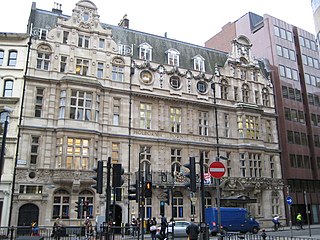
The Metropolitan Borough of Holborn was a metropolitan borough in the County of London between 1900 and 1965. The borough included most of Holborn as well as Bloomsbury and St Giles.

Gresham College is an institution of higher learning located at Barnard's Inn Hall off Holborn in Central London, England that does not accept students or award degrees. It was founded in 1597 under the will of Sir Thomas Gresham, and hosts over 140 free public lectures every year. Since 2001, all lectures have been made available online. As of 2024 the Provost is Professor Martin Elliott.
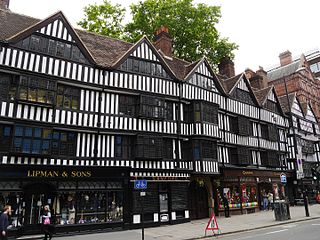
Staple Inn is a part-Tudor building on the south side of High Holborn street in the City of London, London, England. Located near Chancery Lane tube station, it is used as the London venue for meetings of the Institute and Faculty of Actuaries, and is the last surviving Inn of Chancery. It was designated a Grade I listed building in 1974.

The Inns of Chancery or Hospida Cancellarie were a group of buildings and legal institutions in London initially attached to the Inns of Court and used as offices for the clerks of chancery, from which they drew their name. Existing from at least 1344, the Inns gradually changed their purpose, and became both the offices and accommodation for solicitors and a place of initial training for barristers.
The Mercers' School was an independent school in the City of London, England, with a history going back at least to 1542, and perhaps much further. It was operated by the Worshipful Company of Mercers and was closed in 1959.
Portpool was a manor or soke in the district of Holborn, London. It is not recorded in the Domesday Book but references to it occur from the 12th century onwards. For many years it was owned by the Dean and Chapter of St Paul's Cathedral, who let it out to the Grey family. The manor house of Portpool subsequently became known as Gray's Inn, acquiring a reputation for the teaching of law.
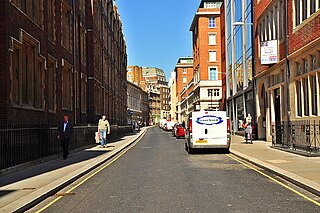
Chancery Lane is a one-way street that forms part of the western boundary of the City of London. The east side of the street is entirely within the City, whilst the west side is in the City of Westminster south of Carey Street and the London Borough of Camden north of that street. The route originated as a 'new lane' created by the Knights Templar from their original 'old Temple' on the site of the present Southampton Buildings on Holborn, in order to access to their newly acquired property to the south of Fleet Street sometime before 1161.

Stone Buildings, Lincoln's Inn were constructed from 1774 to 1780. The architect was Sir Robert Taylor. Stone Buildings is a Grade I listed building. Stone Buildings appear in Anthony Trollope's novel The Prime Minister.

The Mirror of Justices, also known in Anglo-Norman as Le mireur a justices and in Latin as Speculum Justitiariorum, is a law textbook of the early 14th century, written in Anglo-Norman French and traditionally attributed to Andrew Horn. The original manuscript is in the Parker Library, Corpus Christi College, Cambridge.
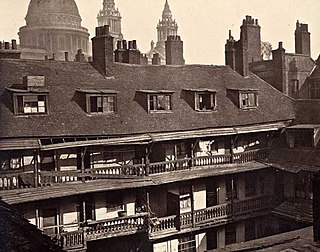
The Society for Photographing Relics of Old London was founded in 1875 in London, England, initially with the purpose of recording the Oxford Arms, a traditional galleried public house on Warwick Lane that was to be demolished as part of the redevelopment of the Old Bailey.

Sir Denys Burton Buckley, MBE was an English barrister and judge, rising to become a Lord Justice of Appeal.
The Royal Commission on the Inns of Court carried out an investigation into the Inns of Court and associated Inns of Chancery between 1854 and 1855. The inns were medieval guild-like institutions that provided accommodation for lawyers and had developed gradually into centres for legal education. All barristers in the country had to be a member of one of the inns. It included many of the leading lawyers and jurists of the time. The commission found many of the inns, particularly the Inns of Chancery, were ineffective at educating students and recommended the creation of a single university of law. Steps were taken to accomplish this and a parliamentary bill was prepared but it was never achieved. The commission did, however, have an influence on legal education for decades and was a factor in the establishment of modern law schools at the universities of Cambridge, Oxford and London.

The revels were a traditional period of merrymaking and entertainment held at the Inns of Court, the professional associations, training centres and residences of barristers in London, England. The revels were held annually from the early 15th to the early 18th centuries and were an extension of a general nationwide period of entertainment running from All Saints' Eve to Candlemas, though in some years they lasted as late as Lent. The inns elected a "prince" to lead the festivities and put on a sequence of elaborate entertainments and wild parties. The events included singing, dancing, feasting, the holding of mock trials and the performance of plays and masques. The revels played an important part in encouraging early English theatre and provided William Shakespeare with one of his most distinguished audiences in his early career. Several plays were written specifically for the revels and legal scenes in many plays from this era may have been written with this audience in mind. The revels declined in the 17th century and they last appear to have been held in 1733. The inns revived the revels in the mid 20th-century and they now comprise a seasonal offering of entertainment in the form of sketches, songs and jokes.
The New Inn was one of the Inns of Chancery or Hospida Cancellarie. It existed from the late 15th century until 1902 and was located near Aldwych in London.




















